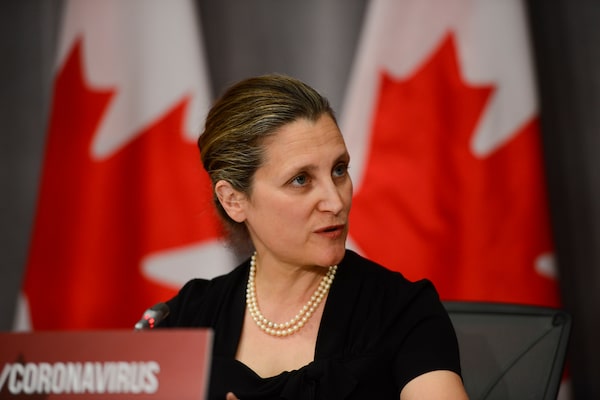
The Deputy Prime Minister, seen here on Parliament Hill in Ottawa on May 4, 2020, told media Monday that while she can’t comment on specific asylum claims, immigration from Hong Kong has ‘benefited’ Canada ‘hugely.’Sean Kilpatrick/The Canadian Press
Deputy Prime Minister Chrystia Freeland, asked about dozens of asylum claims made by Hong Kong protesters in Canada, praised the rich contribution immigrants from this former British colony have made to this country but declined to indicate whether Ottawa would grant the applicants refuge.
Ms. Freeland told media Monday that while she can’t comment on specific asylum claims, which she said need to be adjudicated “very carefully and very thoughtfully," Canadians agree that migrants from Hong Kong have been a boon for this country.
“Canada has benefited hugely from the immigration of people from Hong Kong to Canada. They contribute tremendously to our society and I think all of us are very glad that so many people from Hong Kong have chosen to make their home and their lives here,” Ms. Freeland said.
As the Globe and Mail first reported Monday, 46 Hong Kong citizens – many of whom took part in the massive demonstrations that began last year as China tightened its grip on the Asian city – are seeking asylum in Canada, citing harassment and brutality at the hands of police and fear of unjust prosecution.
This may only be the start of a bigger wave of asylum seekers, experts say.
Guy Saint-Jacques, a former Canadian diplomat, and Richard Kurland, an immigration lawyer and immigration policy analyst with extensive experience in dealing with Asian migration, both say these cases are likely the beginning of a surge in refugee claims from Hong Kong as political turmoil there continues.
The 46 would-be refugees from Hong Kong applied for asylum claims between Jan 1, 2019, and March 31, 2020. The claims, which are all pending, were received at airports, Canada Border Security Agency bureaus and Immigration, Refugee and Citizenship Canada offices (IRCC) across the country. Many of those claiming asylum in Canada face charges in Hong Kong in connection with the protests.
Wenran Jiang, an adjunct professor at the University of British Columbia’s School of Public Policy and Global Affairs, said Canada should proceed cautiously. “If Ottawa officially encourages and offers political asylum to protesters in Hong Kong, even [if] some of them clearly broke the law by being violent, Beijing is likely to interpret such a move as interfering in China’s domestic affairs, leading to adding more chill to an already cold-bilateral relationship.”
Canada’s relations within China deteriorated significantly in late 2018 after Ottawa arrested a Chinese high-tech executive on a U.S. extradition request and Beijing, in what was widely seen as retaliation, locked up two Canadians – former diplomat Michael Kovrig and entrepreneur Michael Spavor.
Conservative MP Garnett Genuis, who sits on the House of Commons Canada-China committee, said there are valid reasons for granting asylum to pro-democracy activists from Hong Kong. He said he hopes Canada doesn’t turn away these claimants for fear of offending China.
“The adjudication of asylum claims is an independent process and certainly determination should never be influenced by politics or fears of political retaliation,” he said. “We should absolutely be accepting asylum claims on their merit and … based on what I have heard about these claims there is a strong case to be made for their merit given the human rights abuses that we know of in Hong Kong.”
Mr. Saint-Jacques, a former Canadian ambassador to China, agrees that Beijing would be displeased if Canada were to grant asylum to Hong Kong pro-democracy advocates, but he also says they merit refuge.
“Given what is happening in Hong Kong and the fact that China is encroaching more and more on the rights of Hong Kong citizens …. clearly these people have a legitimate [reason] to think that their rights will not be respected,” he said.
Mr. Saint-Jacques said he expects there will be a large influx of people coming from Hong Kong in the months ahead, including many of the 300,000 residents of the Asian city who hold Canadian passports.
“I think these people would make a good contribution [to Canada] but the big dilemma for the federal government is that this is happening at the time when we need China’s goodwill to supply medical equipment we are desperate for,” he said.
Mr. Kurland said he thinks the 46 asylum claims may be the beginning of a rise in refugee applicants from Hong Kong.
“There may be legs to this," he said. “Planning for a sudden climb in Hong Kong refugee claim numbers is prudent.”
Today, as many as 500,000 Canadians of Hong Kong descent live in Canada, according to Hong Kong Watch.
With a report from Reuters
Our Morning Update and Evening Update newsletters are written by Globe editors, giving you a concise summary of the day’s most important headlines. Sign up today.
 Steven Chase
Steven Chase Robert Fife
Robert Fife